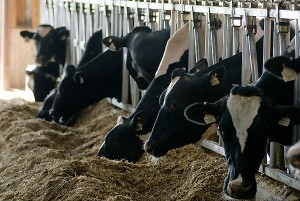MADISON — Agricultural scientists from across the nation are embarking on a new five-year, $10 million, USDA-funded effort to identify dairy production practices that minimize the emission of greenhouse gasses (GHG) and will be more resilient to the effects of a changing climate.
The project is led by the University of Wisconsin-Madison and involves researchers and extension staff from seven universities, five federal labs of the U.S. Departments of Agriculture and Energy, and the Innovation Center for U.S. Dairy.
U.S. Secretary of Agriculture Tom Vilsack announced the project in Madison on May 7 during a visit to the USDA’s Dairy Forage Research Center on the UW campus.
The goal is to find ways to reduce GHG emissions generated in all phases of dairy production while continuing to grow profitability and productivity, says project director Matt Ruark, UW-Madison assistant professor and extension soils specialist.
“We will be working across the entire dairy production system to improve production efficiency while decreasing negative impacts in an effort to support U.S. dairy producers’ ongoing sustainability efforts,” Ruark says.
“This is about adaptation — how to move agriculture forward to be as productive as possible as we move into a changing climate,” Ruark says. “Anything we can do to reduce losses of carbon, nitrogen and water from the system can lead to greater efficiency. This will lead to more profit for the producer, less impact on the environment and a sustainable milk supply for the consumer.”
The project is supported by a coalition of dairy industry organizations, which in 2008 made a voluntary commitment to reduce greenhouse gas emissions from milk production by 25 percent by 2020.
“This award is built on the very strong partnerships that are in place to further the commitment of America’s dairy producers to world-class science and continue to move the dairy industry toward a vibrant, prosperous future in balance with our natural resource base, including climate,” says project co-director Molly Jahn, a UW-Madison professor of genetics and agronomy.
In their quest to identify opportunities to reduce GHG emissions, multidisciplinary research teams will look at all aspects of milk production — dairy rations and dairy cow genetics, manure handling and storage, crops, tillage and rotations — to identify systems that are most effective at retaining carbon, nitrogen, and water while maintaining healthy financial bottom lines.
Among the research partners is the industry-sponsored Innovation Center for U.S. Dairy, which is working with university and federal researchers to refine a decision tool that farmers can use to assess the impact of various management practices on their own farms’ production and sustainability. The decision tool will be informed by the research findings and tested on commercial dairy operations in several states, including farms participating in Wisconsin’s Discovery Farms program.

Under the USDA grant, researchers will look at all aspects of milk production to identify systems that are most effective at retaining carbon, nitrogen and water while maintaining healthy financial bottom lines. Photo: Jeff Miller
There is also an educational component. Science educators will work with public school districts to develop curricula that integrate food and agriculture with cutting-edge approaches to science, technology, engineering and mathematics. That effort includes a partnership with the Milwaukee Public Schools anchored at Vincent High School.
The project is being funded through USDA’s Coordinated Agricultural Projects program, which brings together teams of researchers that represent various geographic areas to support discovery, applications and promote communication leading to innovative, science-based solutions to critical and emerging national priorities and needs.
Along with UW-Madison, the project includes researchers from the University of Arkansas, the University of Michigan, Cornell University, Pennsylvania State University, North Carolina A&T State University and the University of Washington, along with four USDA-ARS laboratories, the U.S. Department of Energy and the Innovation Center for U.S. Dairy.
—Bob Mitchell


